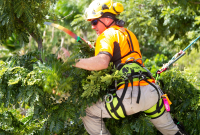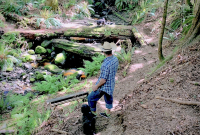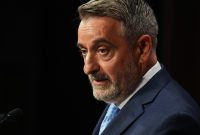Support strong Canadian climate journalism for 2025
After a summer marked by unprecedented wildfire and drought, it’s not surprising the climate crisis is top of mind as the school year launches, Vancouver Island University (VIU) geography professor Jeff Lewis says.
There’s the usual hustle, bustle and excitement with the start of every school year, but virtually everyone returning to campus likely had direct experience with some sort of climate impact over the past few months, said Lewis.
People across B.C. and most of Canada faced a range of issues — whether it was road closures, interrupted travel plans, cloying smoke, or more extreme threats and stress to themselves or loved ones due to mass evacuations or the loss of homes, businesses or communities to flames or floods.
“These are extreme events that have very serious impacts on our lives. So, the natural question is, ‘What can we do about it?’” said Lewis, whose research focus is raising public awareness and action to limit climate change.

Lewis and other VIU experts will discuss options and tackle other pressing climate questions — like how to deal with eco-anxiety — as part of a fall Saturday Speaker Series so community members can learn more ways to take individual action to curb climate change.
Although VIU psychology professor Lindsay McCunn will detail specific strategies and advice in her talk on climate anxiety this Saturday, a good way to prevent being overwhelmed and giving up in the face of the climate crisis is to take meaningful action, Lewis said.
It’s not an all-or-nothing proposition where people must make radical changes — like dedicating their lives to climate action or becoming a vegan overnight, he stressed. Small, doable steps have effects.
“Anything we can do to avoid more extreme climate change is better than nothing,” he said.
“As the saying goes, we have to be careful the search for perfection is not the enemy of the good.”
There are two main avenues for climate action: what we can do as individuals and at a societal level locally, nationally or globally — particularly when it comes to voting, he said.
Personal choices like making fewer trips in gas vehicles, carpooling, taking transit or biking, and buying an electric car if possible can significantly reduce our C02 emissions, he noted.
“One thing we have a lot of control over is our purchasing power, especially when it comes to food,” he added.
Like simply reducing our consumption of meat, particularly beef, since it is the animal protein with the biggest carbon footprint, Lewis said.
Limiting food waste, buying local fruits and vegetables in season, and eating a vegetarian meal once or twice a week are all doable actions that can have larger and more positive ripple effects.
“Research has shown that not many people actually listen to scientists and the experts,” Lewis said.
“Most people are more influenced by the people in their lives, so individuals and community leaders have a strong role in raising awareness and implementing change.”
Being active citizens and wielding the power of the vote to elect people and parties that commit to reducing emissions and propose concrete and effective policies are effective ways to take collective climate action, Lewis said, noting people have more influence on the political system than they think.
Global collective action in the mid-1980s to ban chlorofluorocarbons, which were causing a hole in the ozone layer and U.S. leadership in the international arena on acid rain curbed a pollution disaster can be replicated to deal with climate change, Lewis stressed.
However, political apathy or assuming political progress on important issues always moves forward in a linear fashion is a dangerous supposition, he said, pointing to the extensive damage inflicted on environmental and climate policies during the Trump presidency south of the border.
Canadians should also avoid the belief that existing climate policies can’t or won’t be undone, he said.
“When another government comes into power, those policies aren’t necessarily secure,” Lewis said.
“At the federal level right now, the Conservative Party [of Canada] is running on a platform of eliminating the carbon tax, which from a national perspective, is probably the single most important policy that we've actually implemented.”
Despite political risks and the fact extreme climate events are already happening, significant progress has been made in addressing global warming, Lewis stressed, noting he has been working to increase public awareness and for change for more than two decades.
“We’re no longer having to convince most people of the need to take action or that climate change is human-caused,” he said.
“It’s more a discussion about what policies should we implement.
“We can disagree on the different paths but at least there’s movement forward.”
Rochelle Baker / Local Journalism Initiative / Canada's National Observer






Comments
What is truly bizarre, millennials have shown major concern over climate change, yet have been report to likely vote for conservatives over liberals based on a survey by Abacus. Though I think most surveys or polls are biased garbage, if not fake these days, that is another story.
Do millennials not understand that conservatives refuse to acknowledge that climate change is real and nor do they have a real climate change policy. If they are so concerned about what is happening with our climate, why would you vote conservative knowing that they will just continue to ignore the problem as they are doing now?
Look at Danielle Smith, Doug Ford who have quietly or not so quietly paused or dismantled things that help protect or help climate change. What about Pierre Poilievre who has no interest or willingness to acknowledge climate change? What about Pierre's social media groupies who spread disinformation about climate change? All of these leaders are conservatives.
It seems millennials have their heads buried in the sand or have bought into conspiracy nonsense and disinformation. You can't be concerned about climate change, yet vote conservative.
Wake up people, this will only get worse each year by inaction, and take 100 steps backwards with conservatives.